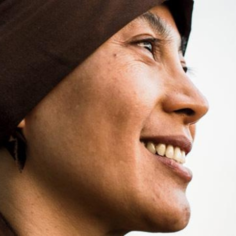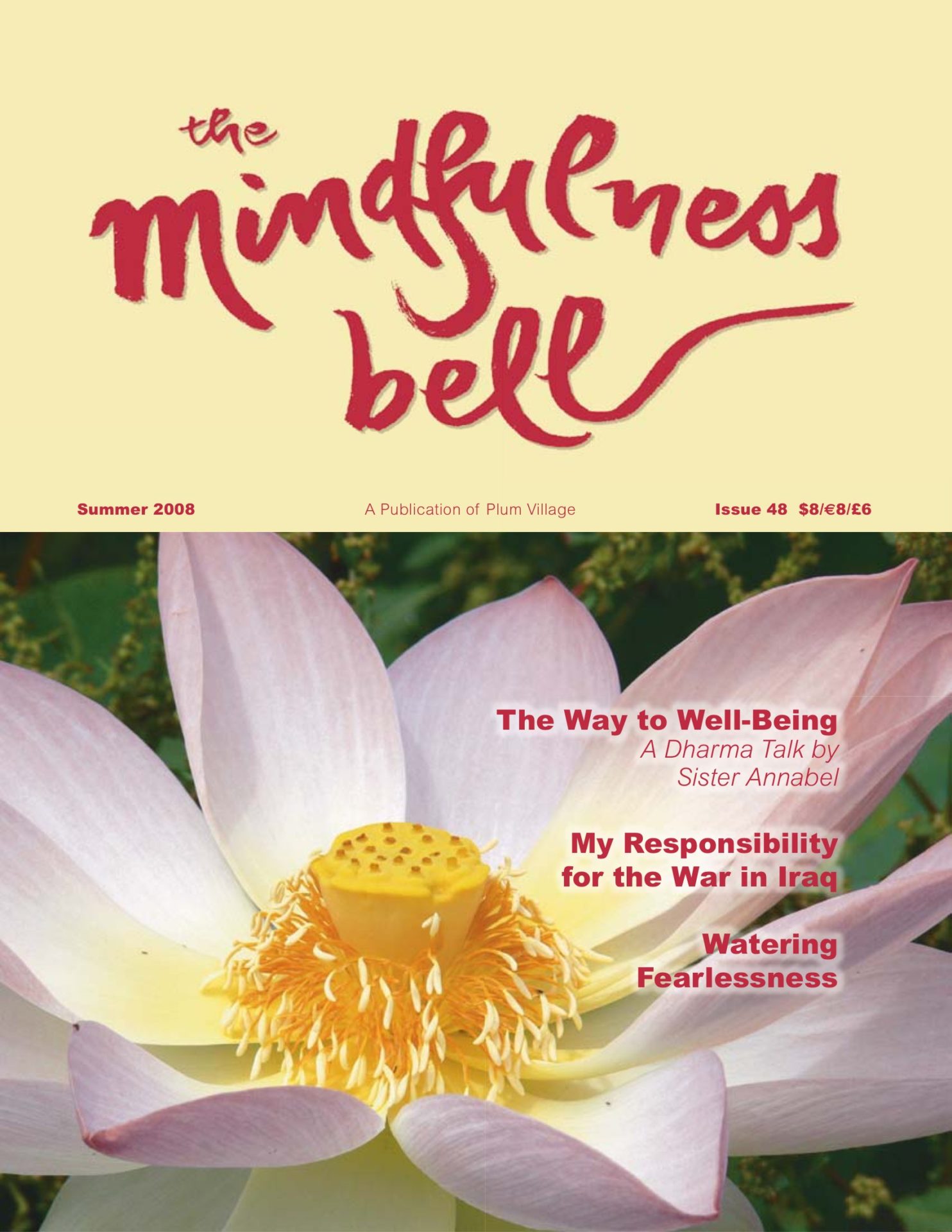For Love to Deepen
By Sister Dang Nghiem in June 2008
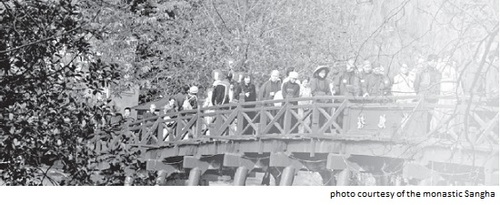

During Thich Nhat Hanh’s trip to Vietnam in early 2007, several Great Requiem Ceremonies were held, to help heal the wounds of war. Here, Sister Dang Nghiem continues her recollections of those powerful events and the deep transformation she experienced. (See part one of her article in the Autumn 2007 issue).
For Love to Deepen
By Sister Dang Nghiem in June 2008


During Thich Nhat Hanh’s trip to Vietnam in early 2007, several Great Requiem Ceremonies were held, to help heal the wounds of war. Here, Sister Dang Nghiem continues her recollections of those powerful events and the deep transformation she experienced. (See part one of her article in the Autumn 2007 issue).
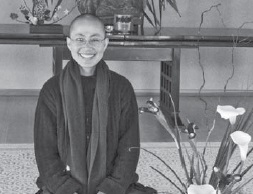
Each day when a ceremony began, the monastic Sangha would do walking meditation from outside the ancestral hall to the front courtyard, then to the main hall of Temple Vinh Nghiem (Adornment with Eternity). Sixty young monks from Prajna Temple walked in front, holding up ceremonial instruments, followed by the Chanting Master of Ceremony (Venerable Le Trang), Thay, the assisting chanting monks, the musicians, the high venerables, and over two hundred monks and nuns from Plum Village, Prajna, and Tu Hieu.
Thousands of people watched the procession in complete silence and respect. Most ceremonies took place in the main hall, and lay people could only observe them by looking in or by watching two big screens in the courtyard. Still, everyone participated wholeheartedly and offered up their concentrated energies to the souls of the departed. Some people had wondered why Thay, a Zen master, would have these ceremonies performed in the Vajrayana (Tantric) tradition. Suddenly, I appreciated the wonderful meaning of ‘‘skillful means.’’ With certainty, thousands of beginners like me would not be able to meditate and concentrate their minds continuously for three days, but they could more easily follow these Tantric ceremonies and benefit from them.
I Stand Still
My thorax feels like a heavy cement block. The in-breaths and out-breaths are superficial and laborious. I intentionally make my abdomen rise and fall, but oxygen seems not to have enough space to enter the lower parts of the lungs. Strange, I had assisted in surgical procedures that were eight to ten hours long when I did have back pain and abdominal pain, but I never experienced chest pain like this. I relax my shoulders and arms, and I continue to follow my breathing.
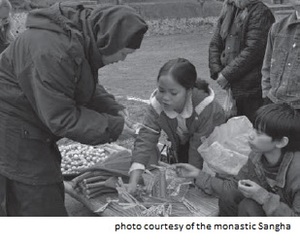

The powerful chanting of the monks stirs my deep consciousness: I see thousands of skeleton figures standing on the water and heading towards the shore without moving. The immense ocean is without waves. Everything about those skeletons and about the space around them is gray and foggy. Suddenly, I realize that I saw these images fifteen years ago, when I was still a medical student at UCSF. There were afternoons when I wandered aimlessly along the beach. I stood watching those gray skeleton figures, not knowing how they were related to me and to the pervasive sadness always haunting me. I had written about them in a poem, titled “Dreams”:
…These days my limbs guide me near the waters.
The sky is gray.
Still, the waves are grayer.
I see stick figures through the mist.
Forever claimed by the sea,
They walk without moving.
Something whispers:
‘‘Walk straight. Walk straight.’’
My heart pulsates, but I am drawn to silence.
I also see people falling down in an open field; I see little children screaming wide-mouthed and lying exhausted on their mothers’ corpses; I see a naked woman curling up in a bush; I see layers of people stacked on each other. I see.
I continue to follow my breathing. I did not know that these images and the innumerable possible deaths were stored in my consciousness. Everything I had ever seen, heard, and perceived; everything my parents, ancestors and society had ever seen, heard, and perceived — they all have been imprinted in my mind. Tears stream down. Sweat oozes in big droplets, even from places I had not known could perspire. My whole body seems to be excreting, and purifying.
For My Mother in Me
I stand still. So that the young girl in my mother can be absolved from injustice. That young girl had left her arid homeland Quang Ngai to go to Saigon for work. She became a maid, and she saved every penny to send home to her mother. Each night, the owner came to her little corner at the back of the house. She curled up under her bamboo bed, but he would not let her be. He used a broom to poke her and get her out. The young girl wandered on the street; her education was minimal, she had no skills, and circumstances pushed her as they had pushed countless young girls in war time. She worked for American soldiers, and she gave birth to my brother and me — Amerasian children who did not know their fathers’ faces. Then she became mistress to a rich old man, in order to take care of her children and relatives.
There were times when my mother would yell at me and beat me up as if I were her enemy. Afterwards, while I was sleeping, she would rub green oil on my bruises and cry. Her dream was to go to America, and all she thought about was leaving. One day in May 1980, my mother went to the market for work as usual, but she never came back. She disappeared at the age of thirty-six. I was only twelve. I remember squatting on the toilet seat, thinking: “Good, from now on she will not abuse me anymore!”
For My Father in My Brother
I stand still. So that the father inside my brother can be absolved from injustice. My brother was born with blond hair and fair skin. He was so beautiful that I used to wrap the embroidered tablecloth around his face and body. He looked like a princess and I carried him on my hip everywhere. Yet children in the neighborhood yelled at him, ‘‘Amerasian with twelve butt holes!’’ They spit on him; they made him the American prisoner in their war games. Sending him to the United States was like severing her own intestines, but my grandmother was well aware that if my brother had remained in Vietnam, he would be teased and shamed and exploited his whole life.
When he got to the United States, children in school yelled at him, ‘‘V.C. go home!’’ because he did not speak any English. Like a wounded animal, my brother lashed out in fury and beat up those kids with all his might. The psychologist diagnosed him as having ‘‘uncontrolled extreme anger.’’ The United States government paid money to put my brother in a rehabilitation center for rich kids who had problems with drug addiction, gang, and other violence. My brother is thirty-five years old now, and he is built like a football player. In his house, there are over sixty guns of different sizes; stacks of bullets lie all over the room. He is a licensed gun dealer. In his house, there are over a hundred videos about the Vietnam War and other violent crimes. My brother cannot sleep without the television on all night. His eyes are gentle and bright, and he smiles often. Yet, my brother’s mind has a dark side, which continues to damage and torment him.
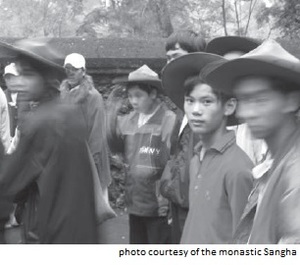
For My Uncles
I stand still. So that my uncles can be absolved from injustice. My eldest uncle (Uncle Number Two) ran away from home to the North to become a Communist. Every so often, soldiers of the [South] Vietnam Republic would call my grandmother to their post, beating her and harassing her about my uncle. After the fall of Vietnam Republic in 1975, my uncle returned to look for his mother and siblings. He brought with him a white pillowcase with red words ‘‘Returning to Motherland”; he had embroidered it while he was serving on the Ho Chi Minh Trail. My uncle enthusiastically took my grandmother to the North to meet his wife and three children. However, he died within six months. Years of suffering from malnutrition, bouts of malaria, tons of bombs and chemical warfare had damaged his heart, lungs, liver, and intestines. My grandmother had to return to the South alone, too stunned to cry.
My youngest uncle (Uncle Number Six) ran away from home to go to Saigon when he was thirteen years old. Not being able to find my mother, he lived on the streets, polishing shoes, stealing things, involved in reckless sexual activities, and later he joined the Vietnam Republic Army. After the fall of [South] Vietnam, my mother sent him to a distant farmland, so that he could avoid the communist rehabilitation camp. He got involved in drinking and womanizing again. The neighbors were angry, and they turned him in to the police. My uncle escaped from prison, swimming over twenty-five kilometers along the river to reach my grandmother’s house. My uncle died before he turned fifty-five. Cigarettes, liquor, and women had drained all of his life energy.
For All the Dead
And I stand still. So that the Vows to the Dead and the compassionate energy of the Three Jewels can absolve injustice for all my people – the people with names but bodies unfound, and the people with bodies but names untraceable. Dying in injustice, and living in repression. Whether or not living people like me are aware, the injustice endured by the dead continues to be choked and repressed in our consciousness. Sometimes we can only breathe at the neck or chest level; our bodies are tense and restless. Sometimes we feel stressed and agitated. We do not understand at times why we think, speak, and behave so negatively and cynically. The undercurrents from countless generations, although invisible, still ravage our lives. Recognizing these forces and calling them by their true names is to span a bridge into the deep consciousness, so that the dead in the living can live with lightness, and so that the living in the dead can truly live.
Tears stream down, but I do not suffer. I give thanks to Thay. He was able to untie the knots in himself, so that today he can establish Requiem Ceremonies to Pray Equally for All People and to Untie the Knots of Injustice in them – creating the favorable conditions for his disciples and his people to uproot and remove these deep internal formations.
